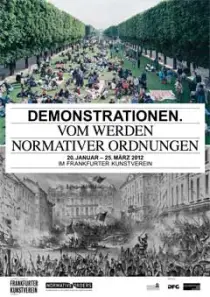Exhibitions
FIXING FUTURES: Planetary futures between speculation and control
April 5 to August 31, 2025
As part of the exhibition “FIXING FUTURES: Planetary Futures between Speculation and Control”, the MGGU – Museum Giersch of Goethe University together with the research center “Normative Orders” invites you to the lecture series “Shaping the Future – Between Climate Change, Technology and Social Responsibility”.
Between May and July 2025, experts from various scientific disciplines will shed light on key issues and challenges in dealing with shaping the future in the face of climate change.
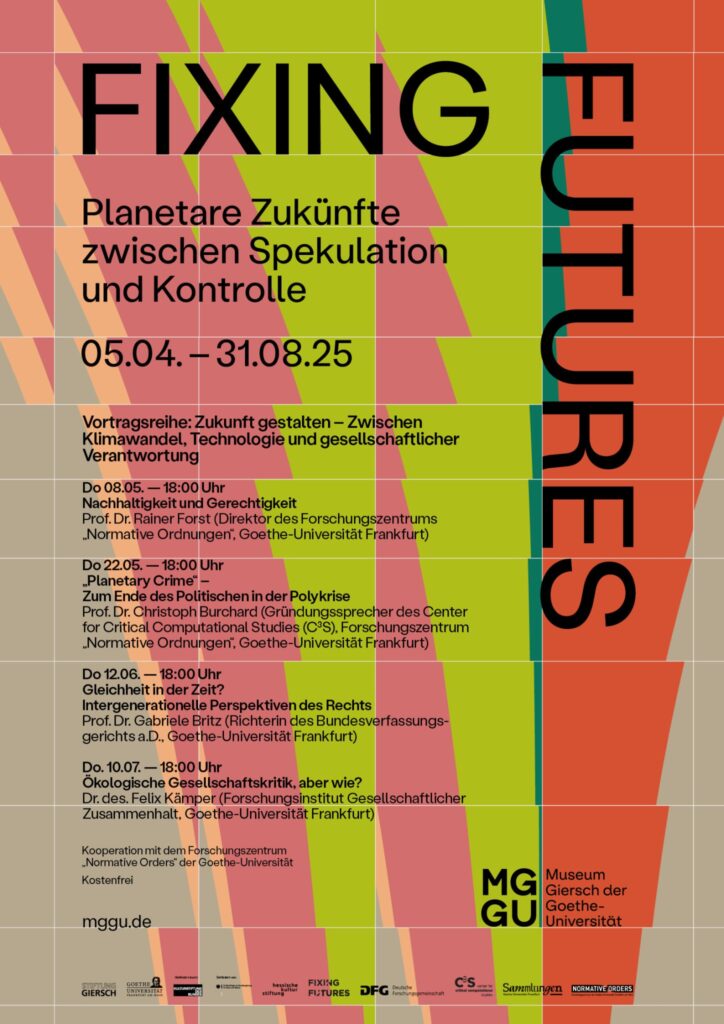
tinyBE – living in a sculpture
June 26 to September 26, 2021
In the open air, the tinyBE exhibition project brings together nine temporarily inhabitable sculptures by international artists in the Frankfurt Rhine-Main metropolitan region for the first time. In Metzlerpark on the Museumsufer in Frankfurt, at the Hessisches Landesmuseum in Darmstadt and in front of the Museum Wiesbaden, the non-profit tinyBE Gesellschaft presents artistically free, visionary, utopian or even dystopian ideas on experimental forms of housing and living. The exhibition picks up on current debates about the future of living and working, socio-cultural challenges and the resource-conserving use of living spaces in artistically and functionally designed small-scale architectures – topics that are also addressed by the scientists of the “Normative Orders” research network.
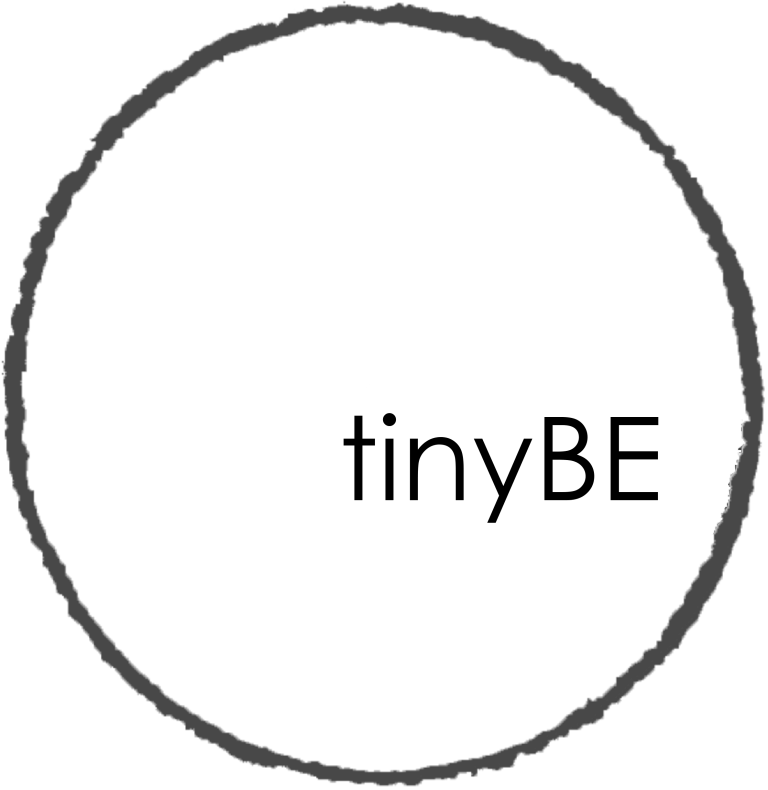
Making Crises Visible
February 12 to June 2, 2020
In the scientific-artistic project “Making Crises Visible”, researchers from the Leibniz Research Alliance “Crises in a Globalized World”, the Research Alliance “Normative Orders” and Goethe University Frankfurt are working together with students from the Offenbach University of Art and Design to develop ideas for the artistic visualization of research results that deal with crises. From 12 February to 2 June 2020, the jointly developed “knowledge art objects” will be on display at the Senckenberg Museum and will be accompanied by a supporting program of various events.
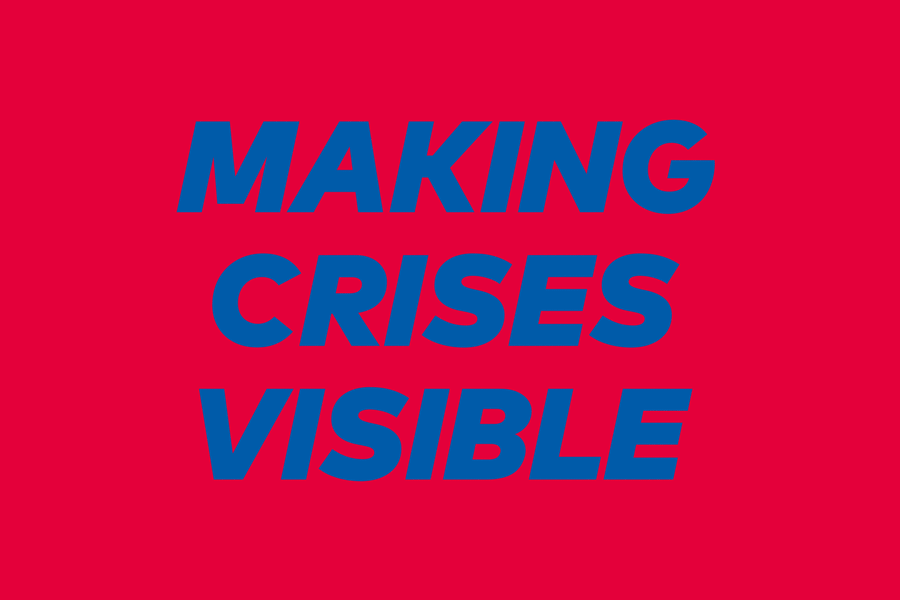
Hanne Darboven – Writing time
May 3 to June 7, 2017
In1976, the conceptual artist Hanne Darboven (1941-2009) published a sequence of 236 sheets under the name “etc. etc.”. In the years that followed, this sequence became her key work “Schreibzeit”, comprising almost 4000 sheets. In “etc. etc.”, Darboven combined the elements of her working method for the first time: minimalist construction principles, her technique of noting time and her way of political commentary through eclectic copying. Hanne Darboven continued to develop her work over the decades with space-filling works on paper, 16mm films, collector’s work on the history of civilization and musical compositions. With etc. etc. from 1976, the 16mm film “Vierjahreszeiten. Der Mond ist aufgegangen” from 1982/83 and the live performance of her composition Opus 17a for double bass solo from 1983 and Opus 26 for string quartet from 1989/90, the Studiengalerie 1.357 shows Hanne Darboven’s working methods in their diversity of media.
Organizers: Research Center for Historical Humanities, University of Music and Performing Arts, Hanne Darboven Foundation, Hamburg and Cluster of Excellence “The Formation of Normative Orders”
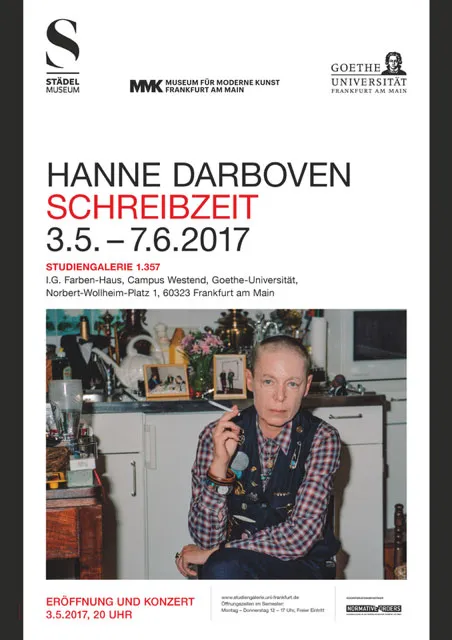
Supporting program of the exhibition “Under Arms. Fire & Forget 2”
September 10, 2016 until March 26, 2017
Der Exzellenzcluster „Die Herausbildung normativer Ordnungen“ verantwortet das Rahmenprogramm der Ausstellung „Unter Waffen. Fire & Forget 2“ im Museum Angewandte Kunst. Die Ausstellung wird am 10. September 2016 eröffnet und bis zum 26. März 2017 gezeigt. Zu den Beiträgerinnen und Beiträgern der ingesamt 14 Podiumsdiskussionen, Vorträge, Filmscreenings gehören Ellen Blumenstein, Prof. Dr. Christoph Burchard, Prof. Dr. Christopher Daase, Prof. Dr. Nicole Deitelhoff, Marco Fey, Dr. Daniel Föller, Prof. Dr. Dr. Günter Frankenberg, Prof. Dr. Klaus Günther, Prof. Dr. Ingeborg Harms, Prof. Dr. Vinzenz Hediger, Prof. Dr. Angela Keppler, Dr. Matthias Kettemann, Dr. Stefan Kroll, Dr. Mahret Kupka, Dr. Valentin Rauer, Niklas Schenk, Prof. Dr. Susanne Schröter, Prof. Dr. Martin Seel, Dr. Daniel Tyradellis, Dr. Thorsten Thiel, Univ.-Prof. Dr. Miloš Vec, Dr. Simone Wisotzki, Ronja von Wurmb-Seibel, Peter Zizka.
Organizer: Museum Angewandte Kunst in cooperation with the Cluster of Excellence “The Formation of Normative Orders”
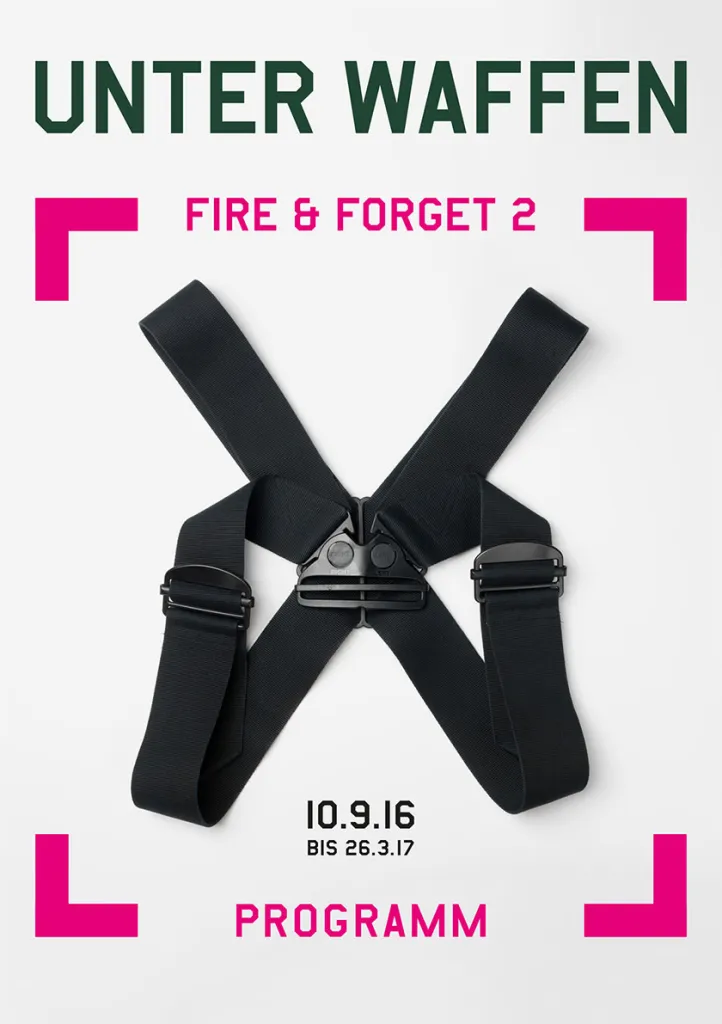
Nous n’avons pas besoin de tuer… Neon installation by Laura J Gerlach
As part of the Luminale 2016, March 13, 2016 to March 18, 2016
Three letterings, clearly visible at three locations in Frankfurt and Offenbach, dominate the architecture, the text message manifests itself while the urban situation disappears into the darkness. A subtle sound that floods into the night emphasizes the relevance of interpreting what is read, of examining one’s own attitude, of taking a stand in response to the textual, political call. And also: to take responsibility as a citizen, as part of the global society with the ability and possibility to change.
Organizer: Cluster of Excellence “The Formation of Normative Orders” with Galerie Marion Meyer, Cultural Office of the City of Frankfurt am Main, City of Offenbach am Main
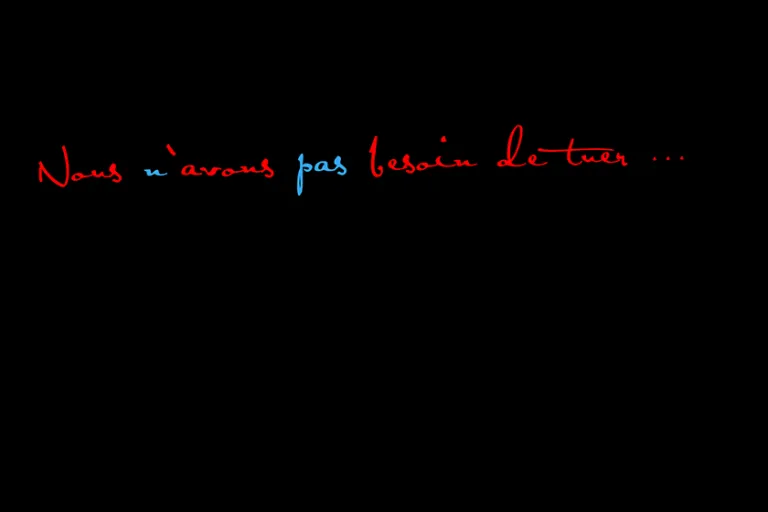
ARAHMAIANI: “Violence No More”
October 12 to 25, 2015
The exhibition “Violence No More” at Haus am Dom is a retrospective of the Indonesian artist ARAHMAIANI. Indonesian contemporary art is virtually unknown in Europe. ARAHMAIANI is one of the few artists from the 2015 Book Fair’s guest country who are touring internationally. She is at the forefront of promoting Indonesian art on the international stage. There is no art metropolis in the world where it has not yet exhibited, no biennial in the north or south to which it has not been invited. The exhibition is curated by Dr. Werner Kraus (Center for Southeast Asian Art, Passau) and organized by Dr. Gunnar Stange (Goethe University) and Dr. Lisa Straßberger (Haus am Dom, Frankfurt). It is part of a cooperation between Haus am Dom, the Collaborative Research Center 1095: “Discourses of Weakness and Resource Regimes” and the Cluster of Excellence “The Formation of Normative Orders” at Goethe University Frankfurt, the Frankfurt Book Fair, the Center for Southeast Asian Art, Passau, and the Frankfurt Research Center for Global Islam (FFGI).
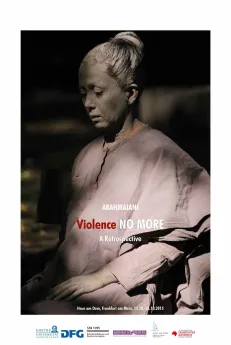
Sense of Doubt. Against forgetting
September 10 to October 11, 2015
To counter the narratives of power, we need a strong sense of doubt. This productive doubt helps us to look into the past. It brings to mind the repressed and also makes us aware of alternatives. With an exhibition of eighteen video artworks in the park of the Museum Angewandte Kunst and a series of lectures and panel discussions, the Sense of Doubt project shows how this sense of doubt can bring alternative memories of historical events to the fore and transfer them into the current global discourse.
A project of the Cluster of Excellence The Formation of Normative Orders together with Sesc São Paulo, Associação Cultural Videobrasil, the Museum Angewandte Kunst and Dr. Paula Macedo Weiß Kulturproduktion, as part of the B3 Biennial of the Moving Image. Further cooperation partners are the Cultural Office of the City of Frankfurt am Main, the Hochschule für Gestaltung Offenbach am Main, the Städelschule Frankfurt am Main and the Goethe-Institut São Paulo. The project is supported by the Kulturfonds Frankfurt RheinMain.
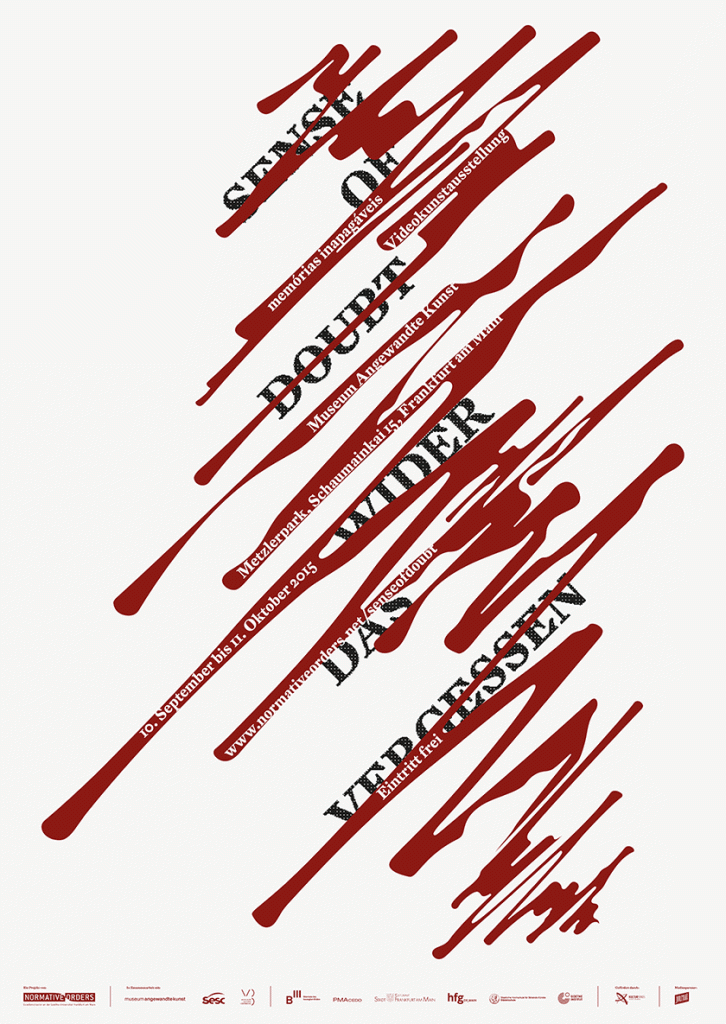
Trevor Paglen: The Octopus
Exhibition June 20 to August 30, 2015
“Trevor Paglen: Octopus” is an exhibition project of the Frankfurter Kunstverein. It takes place as part of RAY 2015 Fotografieprojekte Frankfurt Rhein/Main and is also a cooperation with the Cluster of Excellence “The Formation of Normative Orders” at Goethe University Frankfurt am Main.
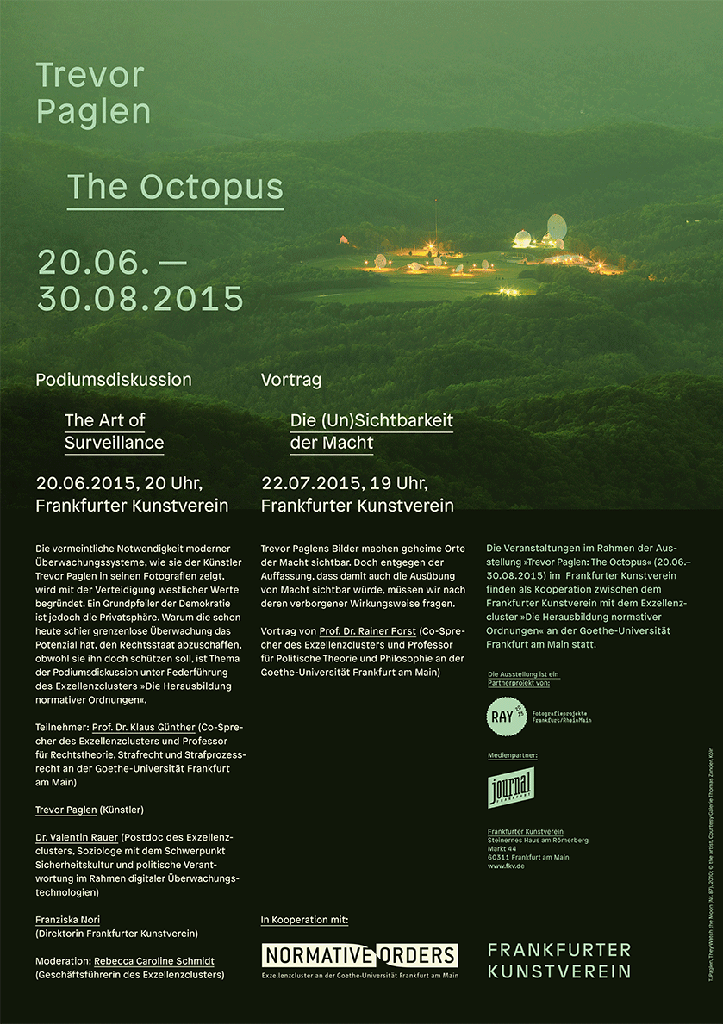
“Climate justice” in the focus of science and art
While climate protection is often only thought of in terms of technological innovation, these two events will focus more on issues of justice. Without more justice, there will be no new climate agreement. The photo exhibition shows people around the world who are already affected by climate change. The panel discussion will address topics such as: Is climate protection against the right to development? Are government regulations preferable or voluntary action? What is our understanding of prosperity? Is geoengineering an option? In short: How do we want to avert the most serious consequences of climate change without major injustice?
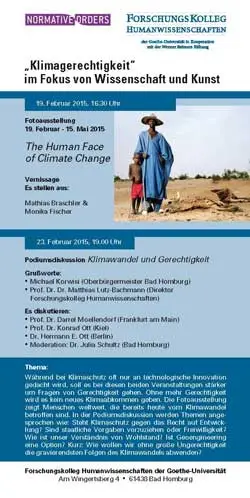
Demonstrations. On the emergence of normative orders
January 20 to March 25, 2012
